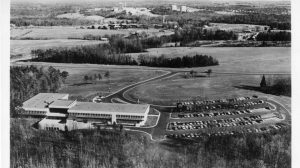Articles

We don’t often think about crossing state lines. Other than changes in gas prices or the availability of fireworks, there’s little visible difference as you cross from North Carolina into South Carolina, or vice versa. This similarity was one of the fundamental assumptions of our Carolinas Urban-Rural Connection project – we expected our 32-county region […]

Cities boom while rural areas struggle. People seeking opportunity leave the countryside for urban areas. Small towns left behind after the local mill or factory closes down are hollowed-out shells. We’ve heard these tropes before; cliches about the urban-rural divide abound. But the Carolinas Urban-Rural Connection project is built on the premise that there’s more […]

“Regionalism” has become something of a public policy bromide these days — an unwritten assumption that informs the planning, economic and growth decisions that supersede any one political jurisdiction. But what is easy to say can be hard to do. For the Carolinas Urban-Rural Connection project, a two-year effort to understand the distinct ways Charlotte […]

About 45 minutes from Charlotte in neighboring Cabarrus County, the owners of 1,000-acre Porter Farms raise chickens and pigs on part of their land. The chickens are sold to Tysons Foods, and the pigs become sausage, pork chops and spare ribs for Smithfield Foods. Another part of the property is a cattle farm, and since […]

The UNC Charlotte Urban Institute is marking its 50th anniversary in 2019-20 with a five-part series recalling its history. Sources for these stories include interviews, newspaper articles, university documents and two books – Charlotte and UNC Charlotte: Growing Up Together by Ken Sanford and Dean W. Colvard: Quiet Leader, by Marion A. Ellis. UNC Charlotte […]

The UNC Charlotte Urban Institute is marking its 50th anniversary in 2019-20 with a five-part series recalling its history. Sources for these stories include interviews, newspaper articles, university documents and two books – Charlotte and UNC Charlotte: Growing Up Together by Ken Sanford and Dean W. Colvard: Quiet Leader, by Marion A. Ellis. Today, amid […]
There’s a not-too-surprising insight about how the labor market is changing across the Carolinas Urban-Rural Connection region, which became clearer from real-time commuter data: out-of-county commuting rates are rising. Many more people work in a different county from where they live. While people are traveling farther for well-paying work, leaders charged with workforce and job […]

The UNC Charlotte Urban Institute is marking its 50th anniversary in 2019-20 with a five-part series recalling its history. Sources for these stories include interviews, newspaper articles, university documents and two books – Charlotte and UNC Charlotte: Growing Up Together by Ken Sanford and Dean W. Colvard: Quiet Leader, by Marion A. Ellis. When Bill […]

The UNC Charlotte Urban Institute is marking its 50th anniversary in 2019-20 with a five-part series recalling its history. Sources for these stories include interviews, newspaper articles, university documents and two books – Charlotte and UNC Charlotte: Growing Up Together by Ken Sanford and Dean W. Colvard: Quiet Leader, by Marion A. Ellis. In 1970, […]

In the far southeastern tip of Montgomery County, where Moore, Richmond and Montgomery counties all converge, a stream with an evocative name flows: Drowning Creek. Drowning Creek is a high quality stream, which means it has little pollution and good aquatic diversity. The creek flows southward into the Lumber River, which was originally called Drowning […]

Charlotte officials moved one step closer to a regional transit plan this week, approving an agreement with other government agencies to hire a consultant and craft a vision for the city and a dozen surrounding counties. While the Charlotte Area Transit System’s $50 million request for funding to plan the Silver Line light rail has […]

It’s Monday, and farmer Isaac Oliver begins his week at the computer. Out on their 72-acre Harmony Ridge Farms in Tobaccoville, Isaac and dad Kevin raise ducks, harvest eggs and grow produce. At the start of each week, Isaac emails his list of available products to nearly 70 restaurants in Charlotte, Winston-Salem, Greensboro, Raleigh and […]